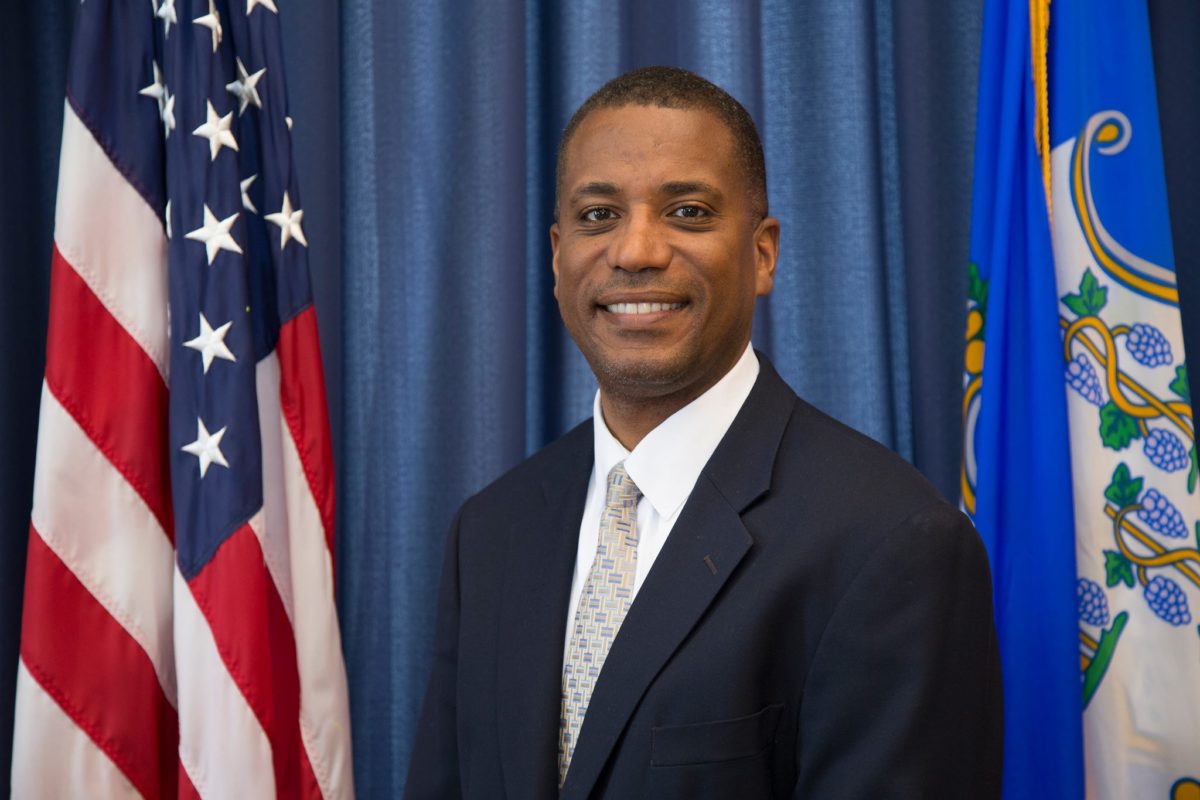The League of Women Voters and Connecticut Public held their latest congressional debate last Thursday at the Torp Theater at Central Connecticut State University’s New Britain Campus. Frankie Graziano, a reporter for Connecticut Public, served as moderator for the debate between Democratic incumbent Jahana Hayes and Republican challenger George Logan.
Connecticut’s 5th Congressional District includes much of the rural northwestern corner of the state as well as several urban centers, including Danbury and the surrounding northern portion of Fairfield County including Bethel, Brookfield, Newtown, Sherman, and New Fairfield.

The debate quickly turned contentious on social issues such as abortion access and trans athletes participating in sports. Logan attempted to walk the line between Republican orthodoxy and popular Connecticut sentiment on both issues by invoking state’s rights without much elaboration. Meanwhile Hayes called for both the federal codification of Roe v. Wade protections and federal support for LGBTQ individuals, which Logan cast as extreme positions.
In terms of economic issues, the distinctions between candidates sharpened even as their debate tactics grew more similar. Both tried to depict their opponent as having been ineffectual during their time in office.
When the topic of mental health was brought up, Hayes touted voting for the Mental Health Matters Act which included her proposed legislation for supporting trauma informed instructional practices. She placed the emphasis on expanding access to telehealth and providing mental health services in schools in the form of counselors and social workers.
“I fought for funding,” Hayes said. “Connecticut got a billion dollars in education funding, separate and apart from American rescue funds with money earmarked for school resources, for mental health services. That has to be part of any conversation that we’re having.”
Logan decried the “alphabet soup” of agencies and programs he said Democrats had started while in control of Congress, calling them ineffectual and the sign of the failures of a “one party system” exemplified by Hayes four years in office.

“The situation still persists. Part of the issue is that funding is not getting down to the level of truly helping the people who need it,” Logan said. He pivoted to arguing that he can work hard with Democrats and Republicans to provide “true negotiations” that will be more effective.
Hayes responded by accusing Logan of misrepresenting the federal system, noting that many of the issues at hand had state-level solutions he failed to implement while he was in Hartford.
Both then disputed who can take credit for Connecticut’s recent surplus.
“We had a tie in the Senate,” Logan said. “We passed some of the most consequential legislation in the last 50 years for the state of Connecticut.” He said that without that tie and his presence, borrowing caps, spending caps and volatility caps that require the paying down of debt would not have been put in place. Those, he claimed, are what have resulted in the state’s budget surplus.
“When Mr. Logan left the state Senate the state was in a $3 billion deficit,” Hayes noted in her reply before claiming the American Rescue Plan Act’s funds were responsible for stabilizing communities recovering from the pandemic.
“The state now has a $5 billion surplus as a result of many of those funds,” she continued. “So, the legislation that he said he would’ve voted against is also the legislation that he’s touting as part of his record.”
Hayes also told the audience that one could only argue that Democrats had accomplished nothing if they disregarded measures to control prescription drug costs, a paying down of the national debt, a $3 billion investment in climate change, the Bipartisan Infrastructure Bill and instituting a 15% corporate tax rate.
“If you consider that nothing then I don’t understand what this role is about for you,” Hayes finished.
Logan responded by digging into the bipartisan infrastructure bill passed last year, decrying that despite totaling over $1.2 trillion not all the funds were allocated to traditional infrastructure projects.
“Less than 25% of that $1.2 trillion went to infrastructure,” Logan claimed. “Approximately 10% of this infrastructure bill actually went to roads and bridges.”
When the question turned to whether the candidates will support augmenting or cutting programs such as Medicare and Social Security, Logan said the top priority was making the economy as strong as possible.
“We must have a strong, vibrant economy, and right now we don’t have that here in Connecticut. Our economy last quarter shrank by 5%,” Logan said while citing a Torrington couple who had lost $100,000 out of their 401(k) due to the stock market. “Personal income growth in Connecticut is the lowest in the nation.”
Logan said Democratic overspending needed to be reined in or will otherwise result in higher taxes and increased inflation.
Hayes responded claiming that Republicans intend to “sunset Social Security” or at least make it subject to regular reviews. Hayes then said, “I know a whole lot of people in this district that don’t own stocks,” adding she would work to expand and strengthen Social Security. She later asserted that the stock market should not be the sole measure of the state of the economy.
Logan complained that this was another instance of a Democrat “putting me in that box.” He asserted that he would go to Washington purely to represent the 5th District, not to appease party leadership.
“There’s nothing wrong with having a Republican on the inside fighting for the people of the 5th Congressional District,” he declared.
On the topic of inflation and rising energy costs, Hayes once again referred to Democratic legislative victories such as the Child Tax Credit and $20 million in Low Income Energy Assistance Program funding that has arrived in the district. She also said that raising the minimum wage and taking steps to encourage affordable housing are necessary steps to addressing affordability and accused Logan of voting against such measures.
Logan in response said that his opponent “believes that the Democratic Party has single handedly saved the economy,” but that the people he has spoken with have seen their economic conditions worsen.
Hayes’ remarks about Democrats singlehandedly saving the economy referenced a comment that she made during a Zoom meeting which she claimed were taken out of context. However, she was unapologetic about the quote and said later in the debate that it was simply how she felt after voting for the Build Back Better Bill.
Both concluded by urging voters to examine both their own records and that of their opponents. Hayes reiterated successes of the past few years while Logan called on voters to deliver a “much needed shakeup.”


















